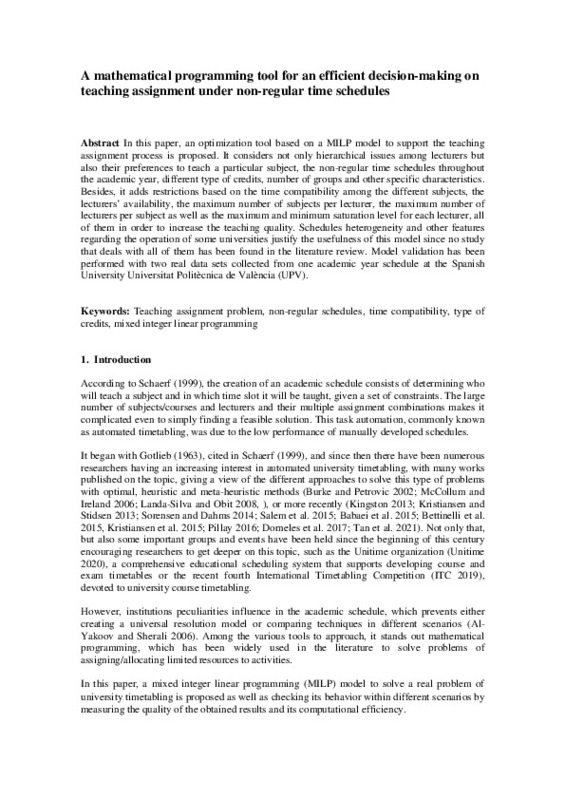Al-Yakoob SM, Sherali HD (2006) Mathematical programming models and algorithms for a class-faculty assignment problem. Eur J Oper Res 173:488–507. https://doi.org/10.1016/j.ejor.2005.01.052
Babaei H, Karimpour J, Hadidi A (2015) A survey of approaches for university course timetabling problem. Comput Ind Eng 86:43–59. https://doi.org/10.1016/j.cie.2014.11.010
Badri MA (1996) A two-stage multiobjective scheduling model for faculty course time assignments. Eur J Oper Res 94:16–28
[+]
Al-Yakoob SM, Sherali HD (2006) Mathematical programming models and algorithms for a class-faculty assignment problem. Eur J Oper Res 173:488–507. https://doi.org/10.1016/j.ejor.2005.01.052
Babaei H, Karimpour J, Hadidi A (2015) A survey of approaches for university course timetabling problem. Comput Ind Eng 86:43–59. https://doi.org/10.1016/j.cie.2014.11.010
Badri MA (1996) A two-stage multiobjective scheduling model for faculty course time assignments. Eur J Oper Res 94:16–28
Badri M, Davis LD, Davis DF, Hollingsworth J (1998) A multi-objective course scheduling model: combining faculty preferences for courses and times. Comput Oper Res 25(4):303–316
Bettinelli A, Cacchiani V, Roberti R et al (2015) An overview of curriculum-based course timetabling. TOP 23(2):313–349. https://doi.org/10.1007/s11750-015-0366-z
Birbas T, Daskalaki S, Housos E (2009) School timetabling for quality student and teacher schedules. J sched 12(2):177–197
Burke E, Petrovic S (2002) Recent research directions in automated timetabling. Eur J Oper Res 140(2):266–280
Ceschia S, Di Gaspero L, Schaerf A (2014) The generalized balanced academic curriculum problem with heterogeneous classes. Ann Oper Res 218:147–163
Daskalak S, Birbas T (2005) Efficient solutions for a university timetabling problem through integer programming. Eur J Oper Res 160:106–120
Daskalaki S, Birbas T, Housos E (2004) An integer programming formulation for a case study in university timetabling. Eur J Oper Res 153:117–135
Dimopoulou M, Miliotis P (2001) Implementation of a university course and examination timetabling system. Eur J Oper Res 130:202–213
Dorneles A, Araújo O, Buriol L (2017) A column generation approach to high school timetabling modeled as a multicommodity flow problem. Eur J Oper Res 256(3):685–695
ETSII, Escuela Técnica Superior de Ingenieros Industriales. Horarios Curso 2015/16. http://www.etsii.upv.es/horario/horarioses.php?cacad=2015.html/ Accessed 1 June 2015
Fonseca GHG, Santos G, Carrano E, Stidsen T (2017) Integer programming techniques for educational timetabling. Eur J Oper Res 262(1):28–39
Gotlieb CC (1963) The construction of class-teacher timetable. In: Proceedings of the IFIP Congress 62, Munich, North Holland, Pub. Co., Amsterdam
Hultberg TH, Cardoso DM (1997) The teacher assignment problem: a special case of the fixed charge transportation problem. Eur J Oper Res 101:463–473
Ismayilova NA, Sagir M, Gasimov RN (2007) A multiobjective faculty course time slot assignment problem with preferences. Math Comput Modell 46:1017–1029
ITC (2019) https://www.itc2019.org/home
Katsaragakis IV, Tassopoulos IX, Beligiannis GN (2015) A comparative study of modern heuristics on the school timetabling problem. Algorithms 8:723–742
Kingston JH (2013) Educational timetabling. In: Uyar AS, Ozcan E, Urquhart N (eds) Automated scheduling and planning, studies in computational intelligence, vol 505. Springer, Berlin, pp 91–108
Kristiansen S, Stidsen TR (2013) A comprehensive study of educational timetabling—a survey. Technical report, DTU Management Engineering
Kristiansen S, Sørensen M, Stidsen TR (2015) Integer programming for the generalized high school timetabling problem. J Sched 18:377–392
Landa-Silva D, Obit JH (2008) Great deluge with non-linear decay rate for solving course timetabling problems. In: Intelligent systems, 2008. IS’08. In: 4th international IEEE conference, IEEE, vol 1, pp 8–11
McCollum B, Ireland N (2006) University timetabling: bridging the gap between research and practice. In: Proceedings of the 5th international conference on the practice and theory of automated timetabling, pp. 15–35
Mühlenthaler M, Wanka R (2016) Fairness in academic course timetabling. Ann Oper Res 239:171–188. https://doi.org/10.1007/s10479-014-1553-2
Pillay N (2016) A review of hyper-heuristics for educational timetabling. Ann Oper Res 239:3–38. https://doi.org/10.1007/s10479-014-1688-1
Salem M, Al-Yakoob SM, Sherali HD (2015) Mathematical models and algorithms for a high school timetabling problem. Comput Oper Res 61:56–68
Santos HG, Uchoa E, Ochi LS, Maculan N (2012) Strong bounds with cut and column generation for class-teacher timetabling. Ann Oper Res 194:399–412
Saviniec L, Santos M, Costa A, Santos L (2020) Pattern-based models and a cooperative parallel metaheuristic for high school timetabling problems. Eur J Oper Res 280(3):1064–1081
Schaerf A (1999) A survey of automated timetabling. Artif Intell Rev 13(2):87–127
Skoullis VI, Tassopoulos IX, Beligiannis GN (2017) Solving the high school timetabling problem using a hybrid cat swarm optimization based algorithm. Appl Soft Comput 52:277–289
Maximal Software (2021) Optimization Modeling http://www.maximalsoftware.com/mpl/. Acceded on 11th January 2021
Sørensen M, Dahms FHW (2014) A two-stage decomposition of high school timetabling applied to cases in Denmark. Comput Oper Res 43:36–49
Tan JS, Goh SL, Kendall G, Sabar NR (2021) A survey of the state-of-the-art of optimisation methodologies in school timetabling problems. Expert Syst Appl 165.
Tassopoulos IX, Beligiannis GN (2012) A hybrid particle swarm optimization based algorithm for high school timetabling problems. Appl Soft Comput 12:3472–3489
Tassopoulos IX, Iliopoulou C, Beligiannis GN (2020) Solving the Greek school timetabling problem by a mixed integer programming model. J Oper Res Soc 71(1):117–132
Unitime (2020) https://www.unitime.org
[-]







![[Cerrado]](/themes/UPV/images/candado.png)


